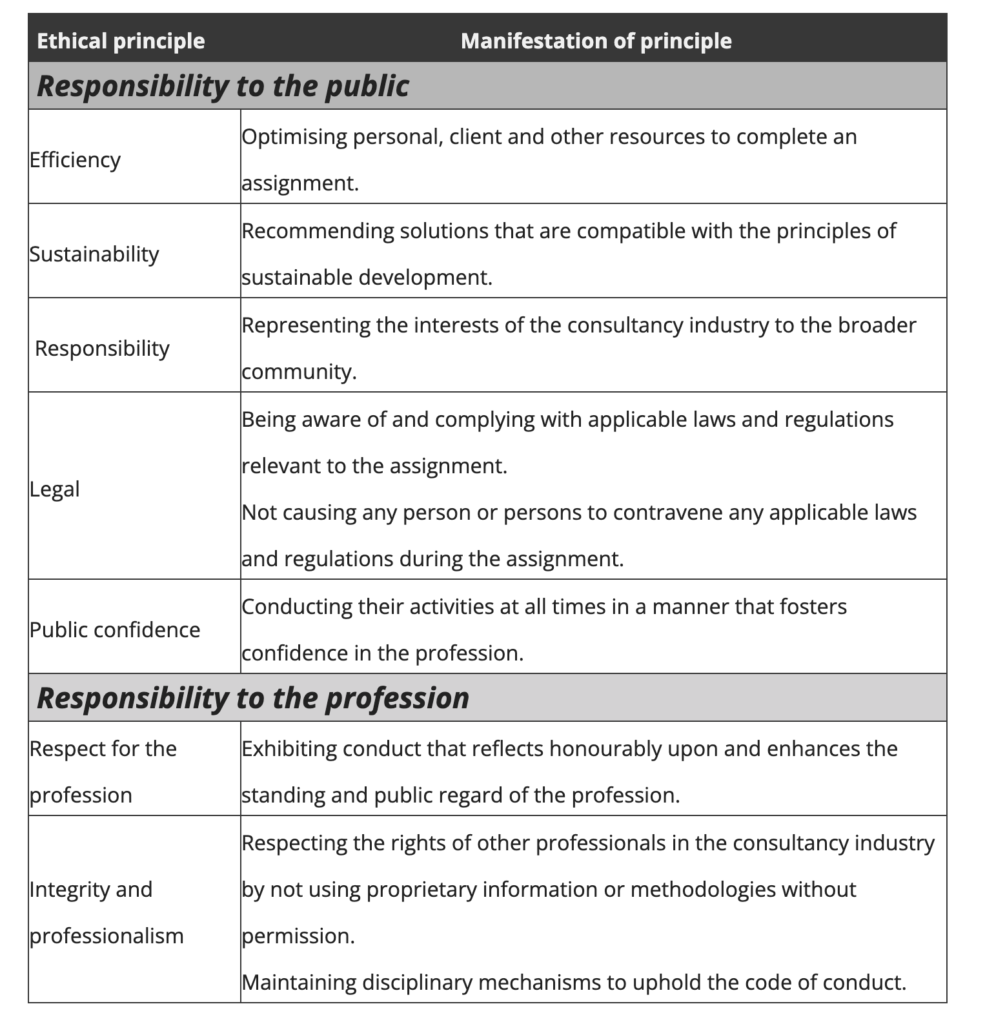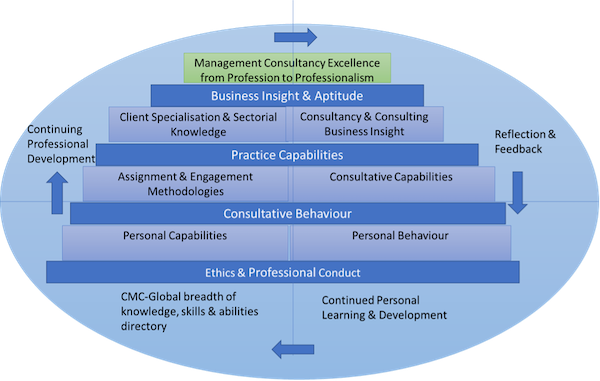Becoming a management consultant
Professional Management Consulting
So, You Want To Become a “Professional Management Consultant”?
Dr Alan J Blackman PhD CF CMC-AF LIMC (Emeritus)
You’ve just finished your MBA, and you’re thinking, now what? You think:  I know, I’ll become a management consultant. I’ve all this new knowledge, and, on top of my ten years as a middle manager with the ACME Corporation, and five before that working for government; well, I’m a natural, aren’t I? Well, maybe.
I know, I’ll become a management consultant. I’ve all this new knowledge, and, on top of my ten years as a middle manager with the ACME Corporation, and five before that working for government; well, I’m a natural, aren’t I? Well, maybe.
So what exactly is a ‘management consultant’? Hmmm … . What does one do? And, what personal qualities and other skills do I need? And, how do I go about it? Now, you don’t need a specific recognised qualification to call yourself a “Management Consultant”, but you do need to be credible. So, what is management consulting, and what does it mean to be a professional?
Management consulting is an advisory service contracted to improve organisational performance, address management challenges, help solve management problems, identify and assist clients in taking full advantage of growth opportunities, and assist with implementing change[1-3]. It is a dynamic and rapidly evolving profession requiring individual consultants to reinvent themselves constantly to maintain relevancy[1, 2].
What type of person should I be?
There are eleven traits essential to being a professional consultant[1, 2, 4]:
- Integrity and honesty – the commitment to act and advise within an ethical framework
- Balanced – a stable personality with well-developed interpersonal qualities and skills
- Independence – always committed to providing objective advice
- A clear communicator – as a speaker and a writer
- Trained and experienced – resulting in expertise in specific management functions and issues, plus an overall breadth of knowledge across functional management areas
- Intuition and awareness of the current challenges being faced by organisations and their management, as well as of emerging trends and technologies
- Proficiency at problem identification and critical thinking – with the ability to use appropriate diagnostic and analysis tools and techniques
- Skilled at “dilemma solving”[1, p. 781] – of finding innovative solutions to problems
- Sense of timing – a refined feel of when to act, aware of the situational realities
- Outcomes focused – able to understand the futurity of their recommendations and resulting actions
- Ability to assist clients in implementing solutions successfully when requested
Above all, know thyself. Every consultant will be asked to conduct a SWOT analysis for a client at some point. But how many have undertaken an analysis of their strengths and weaknesses and then really sought to identify the opportunities and threats they face? In my experience, few.
Completing a self-SWOT can be emotionally challenging, yet the insights gained are fundamental to understanding what value a consultant can and cannot add to their clients’ businesses. It is also essential to grasp what additional skills will have to be acquired to succeed as a professional. The key to a successful SWOT analysis is not just to identify each strength and weakness but, having done so, to question its relevance. Asking ‘so what’ is just as important as answering the questions, ‘what are my strengths’ and ‘what are my weaknesses?’. Using the ten traits listed above, try categorising them as your strengths or weaknesses. How did you go?
Okay, now you are on your way. You’ve got a shingle made – “Fred Blog, MBA(Omniscient Uni), Professional Management Consultant”, and it’s nailed to your front door. That was easy.
But, hang on, what’s a “professional”?
The word “professional” has several meanings and is dependent on context. In the case of consulting, the definition I’ve chosen to apply here is that a professional is “a person who, for gain, does a job that needs special training and a high level of education and who has a lot of skill and experience, characterised by or conforming to the technical and ethical standards of a profession”[5, 6]. A key characteristic of professional practice in management consulting includes a set of recognised ethical norms, shared and applied by the profession’s members. An agreed code of conduct should be observed to guide each consultant’s ethical and professional conduct during an assignment. This code of conduct should include essential professional behaviour, sustainability, social responsibility, conflict of interest, and integrity[7].
In Australia, the standards for a Certified Management Consultant (CMC) and those who work with them can be found in the IMC Australia Code of Professional Conduct and Ethics (“the Code”)[7]. Together with the interpretation statements, the Code clearly defines what is proper in conducting one’s business as a professional management consultant. Globally, examples for developing a code have been specified in the ISO’s “Guidelines for management consulting services”[8].
Many professional organisations such as those representing management consultants, lawyers, architects and engineers have developed a ‘Code of Ethics, and these codes help the members put ethics into practice. In management consulting, ethics can best be defined as the voluntary assumption of an obligation to exercise judgement and self-discipline above and beyond legal requirements. However, the norms laid out in the code demand more than respecting the law. After all, legitimate behaviour may not always be considered entirely ethical.
In many situations, though, it is not always possible to refer to the letter of the code or a formal declaration of norms by an employer to know genuinely professional and ethical behaviour. Therefore, the management consultant must be guided by their code of ethics and conduct based on their background, development, beliefs, and perception of what is proper or improper and beneficial or not to the community, the client and other stakeholders. It is incumbent on those in professional practice to hone their ethical parameters through training, research and diligence. (It’s now time to review your SWOT Analysis).
Table 1: Examples of guidelines for management consultancy service providers (MCSP) for a code of conduct [Institute of Management Consultants (Australia) cited in 8, p. 22].

Should I Join a Professional Network?
Management consultants in many countries have established voluntary professional associations to represent their common interests. These associations play a leading role in promoting professional standards, gaining management’s confidence, and promoting the reputation of management consultants in society. Perhaps most importantly, these organisations guide consultants’ ethical practices and enforce codes of professional conduct.
The principal professional body for management consultants in Australia is The Institute of Management Consultants (Australia) (“the IMC”). However, worldwide there are some fifty national institutes or IMCs. The Code identifies those obligations that protect the public and the client. It is also designed to recognise members’ expectations concerning other members and the profession.
The following summarises the content of the code in force in Australia. The Australian Code is like codes for other national professional management consulting organisations. The complete Code and its Statements of Interpretation are an integral part of the Common Book of Knowledge for CMCs in Australia, and if you are to be a professional management consultant, you will need to know and abide by this Code:
- Management consultants must consider their responsibilities to the public and the profession. Therefore, they must act according to the Law and may not speak on behalf of the profession without appropriate authorisation.
- Management consultants must maintain the dignity and prestige of the profession. They must not damage it in any way.
- Management consultants must act in their client’s best interests, providing professional services with integrity, objectivity, and independence. Among other responsibilities to the client are strictures regarding competency and ensuring clients are fully informed regarding how an assignment will be carried out and for what fee. Conflicts of interest must be declared. Client confidentiality must be maintained.
- Management consultants have a responsibility to other members in that they must inform another member before undertaking a critical review of that member’s work. In addition, a consultant must report the unbecoming professional conduct of another member.
- Members are also expected to be conversant with the Profession’s Common Body of Knowledge and to strive to keep abreast of developments in any area of the profession where specific expertise is claimed.
- Anyone working under the leadership or direction of a member must act within the bounds of the Code.
A member of the IMC in Australia has a responsibility to several stakeholders to prevent acts or omissions that harm or could cause damage to the public, consulting, other members of IMC Australia, and or a client. They must make themselves aware of those aspects of their work or public activities that could breach professional conduct and plan the steps required to avoid a breach and manage any risk of harm. When leading a team on a project, the member must ensure that everyone under their direction adheres to the Code.
By becoming a “professional management consultant” and a Member of the IMC, you become part of a worldwide network of tens of thousands of like-minded professionals. The IMC is a member of an international group for national institutes known as the International Council of Management Consulting Institutes (ICMCI or CMC-Global). Based in Geneva, Switzerland, CMC-Global is a worldwide membership organisation and a network of management advisory and consultancy associations and institutes with a common purpose and shared values and goals. It seeks “to be a leader in developing management consulting as a global profession that drives social and economic success”[9]. CMC-Global also has as knowledge sharers some eighty academics from around the world and in July 2001, was granted Special Consultative Status by the United Nations Economic and Social Council (ECOSOC).
So, now you know what professional qualities and skills you will need to be professional, and that you can become part of an extensive national and international network as a member of the IMC.
But, what exactly is it that you do again?
As already stated, management consulting is an advisory service contracted to improve organisational performance, address management challenges, help solve management problems, identify and assist clients in taking full advantage of growth opportunities, and assist with implementing change. Your ability to do those things is based on two assumptions: firstly, your capabilities, and secondly, that you can find organisations that need that capability. To become a truly professional management consultant and gain certification, you must develop and maintain professional competency. To guide you, CMC-Global has developed a “Competency Framework” (Figure 1). Now you know.

Good luck!
Alan J Blackman PhD CF CMC-AF LIMC (Emeritus)
References
- ILO, Management Consulting – A Guide to the Profession. Fourth ed, ed. M. Kubr. 2002, New Delhi: Bookwell Publications.
- Smith, R.C., Mind for Hire. A practitioner’s guide to management consulting. 2000, Nedlands, WA: University of Western Australia Press.
- Weiss, A., The Consulting Bible. Everything you need to know to create and expand a seven-figure consulting practice. 2011, Hoboken, NJ: John Wiley & Sons.
- Dawson, R., Developing Knowledge-Based Client Relationships. Second ed. Leadership in Professional Services. 2005, Oxford, UK: Elsevier Butterworth-Heinemann.
- Merriam-Webster Dictionary. 2022 [cited 2022 7 March]; Available from: https://www.merriam-webster.com/dictionary/professional.
- Oxford Learners Dictionary. 2022; Available from: https://www.oxfordlearnersdictionaries.com/definition/american_english/professional_2
- IMC Australia. Our Mission. IMC Strategic Plan 2018-2021 2018 [cited 2022 6 March];
Available from: https://www.imc.org.au/Web/About/Mission-Strategy/Web/Mission-Strategy.aspx?hkey=fca486b2-de1c-47ad-bc10-c282c87ff680 - ISO, ISO 20700:2017(E): Guidelines for management consultancy services. 2017, ISO: Geneva, Switzerland.
- CMC-Global. Global Management Consulting Community. 2020 [cited 2022 18 February]; Available from: https://www.cmc-global.org/content/global-management-consulting-community.
- CMC-Global, Certified Management Consultant (CMC) Competency Framework Overview. 2021, The International Council of Management Consulting Institutes: Geneva, Switzerland. p. 2.22